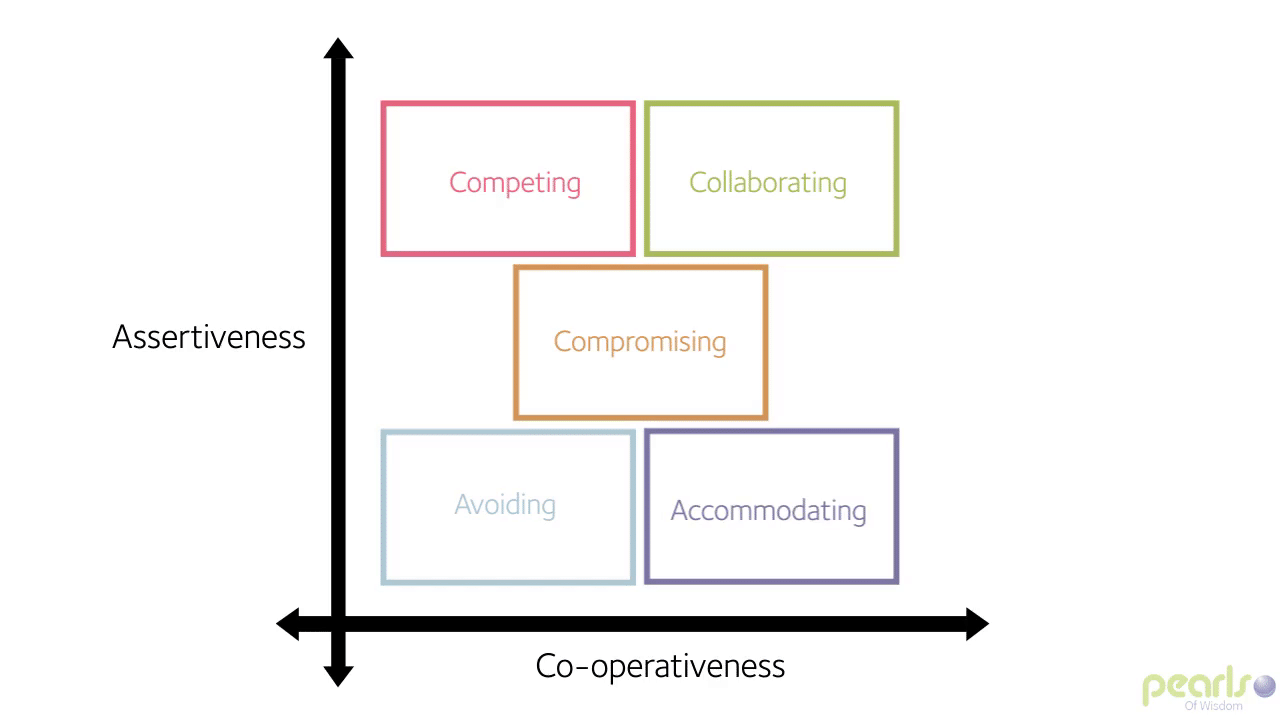In your professional life, assertiveness isn’t just about being proactive and getting ahead.
Whilst it’s a useful trait to ensure you’re fairly compensated, receive proper credit for your work and don’t get marginalised, it’s also an invaluable response mechanism to something that – unfortunately – crops up at various stages of everyone’s career… conflict. Whilst avoiding conflict is a natural instinct, it’s actually more useful to have strategies and tools that you are ready to deploy when conflict situations, inevitably, arise.

The Thomas-Kilmann Conflict Mode Instrument (TKI) is a self-assessment technique designed by Kenneth W. Thomas and Ralph H. Killmann in the 1970s. It maps an individual’s responses to 30 pairs of statements in order to analyse their behaviour in conflict situations. The mapping places the individual along two different axes, cooperativeness (the extent to which someone tries to satisfy other peoples’ concerns in a conflict situation) and assertiveness (the extent to which they try to satisfy their own concerns in these situations).
When plotted against one another, the respondent’s level of cooperativeness and assertiveness in conflict situations places them into one of five ‘areas’: competing, collaborating, compromising, avoiding or accommodating.

Being too assertive can place you in the competing box, where you pursue your own concerns at other peoples’ expense, leveraging any and all power available to ‘win’ your own position. Useful in emergencies, but unlikely to win you many supporters in the long-term.

In direct contrast, showing no assertiveness and an unwavering commitment to cooperation lands you in the accommodating box, where you completely neglect your own concerns and priorities in order to satisfy those of others. Being accommodating can certainly be useful on occasions where ‘peace’ is more productive than ‘winning’, or if you want to collect a favour to cash in further down the line, but not a sensible approach to deploy regularly if you want people to take you seriously.
Avoiding is self-explanatory, and involves pursuing neither your own ends, nor anyone else’s – only really appropriate when the controversy or conflict is utterly pointless to begin with!

The most useful approaches are collaborating, which involves scoring highly on both axes, and compromising, which is moderate on both. The former involves bringing a wide variety of viewpoints together and is useful when the situation/conflict is too important or complex for simple, binary trade-offs. This approach means that you are able to put your viewpoint forward, actively listen to the viewpoint of others (and challenge them on it if necessary), but the overall concern is that a useful, mutually agreed solution is reached. Your own assertiveness balances with that of others, rather than overriding it.

Finally, compromising is about finding a quick solution which satisfies both or all parties at least slightly. It’s really important when some decision or conclusion is better than none at all, or when the price of the conflict is higher than the impact of delay.
What’s clear from the TKI and its various areas is that, whilst assertiveness is an essential ability, controlled assertiveness is even more important. It’s good to have the development objective of becoming a ‘more assertive person’, particularly if the TKI drops you in the ‘compromising’ box – there’s no doubt your career will benefit.
However, it’s even better to try and develop assertiveness like a muscle, something you’re confident with but don’t necessarily have to use all the time. If you’re able to deploy it in a nuanced, context-sensitive way, you can ensure that, when conflict crops up, which it definitely will – you’re contributing to the best and most productive outcome for yourself and your organisation.

Assertiveness is one of many underappreciated, ‘background’ skills that Eliesha can support your people and teams to develop. Our skills workshops, whether delivered face-to-face at your premises or online in our virtual learning environment, focus on translating useful theory into practical actions, meaning learners return to their day-to-day roles ready to make immediate, positive changes.
To receive a course outline for an assertiveness workshop and arrange an exploratory chat around how Eliesha can support your learning and development objectives, get in touch via the Talk to Us page.
We can also support your teams with access to engaging microlearning in the form of our award-winning pearls of wisdom®. Below, you can watch P150 – Conflict – Thomas & Kilmann, which describes the TKI and its five areas in detail, framing assertiveness and cooperativeness in useful context for learners in a short burst of learning.